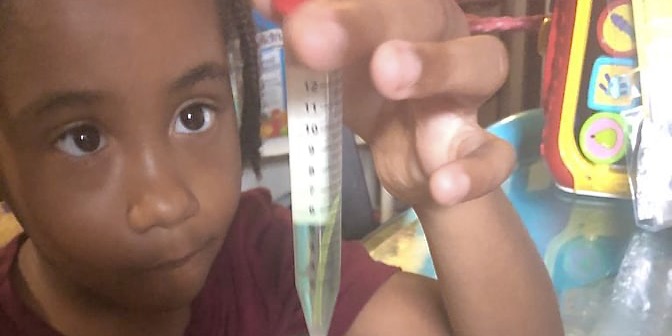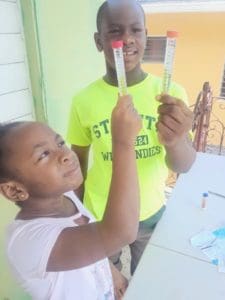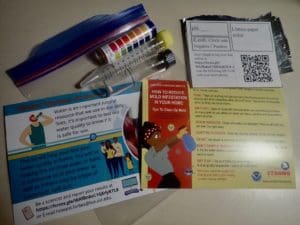
Students in the U.S. Virgin Islands can practice science at home while seeing the real-world application thanks to youth-friendly home water-testing kits, developed and being distributed by the Virgin Islands Marine Advisory Service and Virgin Islands Experimental Program to Stimulate Competitive Research.
Howard Forbes Jr., coordinator for Marine Advisory Service, said the project helps students see how science can have meaning in their everyday life.
“It gives them a sense of ownership, in terms of ‘I get to see what’s in my water that I use at home. Can I use this water to drink? Can I use this water to bathe? Is it safe?” Forbes said.'”I think that is really valuable.”
The kit includes a centrifuge tube, litmus paper strip and a color chart for the litmus test to analyze results. A vial and foil paper are included for bacteria testing. The USVI Storm Strong Program will provide an information card.
Students fill the centrifuge tube with water from the sink, dip the litmus strip in the water for about five seconds and record the color on the strip. They can then look at the information card to see what the pH level is. The data is then logged online.

(The pH scale specifies how acid or base an aqueous solution is. Lower pH values indicate solutions are more acidic, while higher values indicate solutions are more basic, or alkaline. At room temperature, pure water is neutral and has a pH of 7. The letters pH stand for “potential of hydrogen,” since pH is in essence a measure of the concentration of hydrogen ions in a substance.)
To test for bacteria, students will fill the vial half-full and wrap it in foil to eliminate sunlight. In two to three days they can look to see if there was a color change and the presence of a cloudy substance. If there is a cloudy substance, that means that bacteria is present. The kit does not make it possible to tell how much bacteria is in the water, only whether bacteria is present. Individuals can contact the St. Thomas Long Term Recovery and Rotary East, which have been helping distribute water filters.
Students learn about pH levels and bacteria in schools, “but there is no tie in back to the natural system, especially what we have here. This kit helps to tie those together and as another added benefit it engages them virtually,” Forbes said.
This activity has been done before in the classroom setting, where students test their water at home and share the results in the classroom. During the pandemic, it was a lab exercise that could be duplicated in a virtual setting as a big portion of the work – what was done in the classroom was done at home.
The testing kit reinforces skills that the students learn and can use in their academic future. For example, the testing process of pH is something that students will probably have to do in chemistry class.

On St. Thomas, 450 kits will be distributed through the Virgin Islands Children’s Museum and teachers. On St. Croix, 300 kits will be distributed to teachers at the St. Croix Educational Complex and then distributed to students. The plan is to communicate with science teachers at St. Croix Central High School to get kits into the hands of students at both of the island’s public schools.
The Children’s Museum has distributed kits to St. Andrews Episcopal Church Youth Committee, Nana Baby Home, Longpath Community Center, St. Croix Environmental Association and Catholic Charities on St. Thomas, St. John and St. Croix.
Distribution of the kits has been affected by COVID-19 and only 140 had been distributed as of Tuesday. The intent was to issue more kits last week, but that was when Gov. Albert Bryan Jr.’s latest stay at home order went into effect.
The funding for this program came from the Water Resources Research Institute at the University of the Virgin Islands and the Community Foundation of the Virgin Islands.





